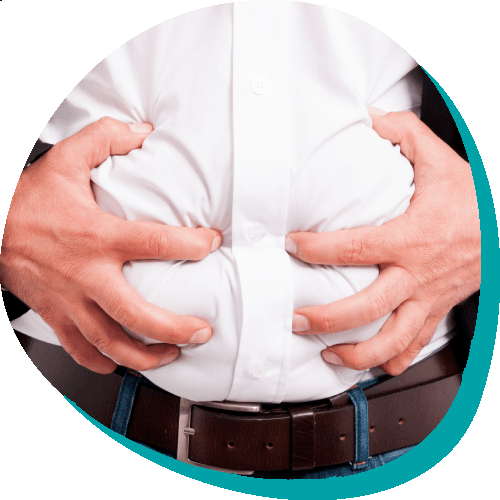Gas can be a literal pain in the gut, and the resulting pressure can make you feel uncomfortable and lethargic for hours. Thankfully, there are ways to reduce belly bloat and get back to living your life. Read on to learn what causes that uncomfortable abdominal pressure, how to prevent it in the future, and how to get rid of bloating.
What Causes Bloating?
Bloating refers to a sense of fullness in the upper abdomen, which can be caused by gas or a full stomach.1 Although people may describe their experiences with bloating differently, it is commonly referred to as a sensation of a distended abdomen, abdominal tension, or the feeling of increased pressure within the abdomen.2
However, bloating doesn’t just occur on its own. There are many reasons why someone may develop an excess of gas. Digestive disorders and autoimmune diseases are sometimes to blame,3 but there are many other common factors which may lead to someone feeling as though their belly is about to burst:
- Swallowing excess air while eating
- Drinking carbonated beverages
- Poorly fitting dentures
- Chronic postnasal drip
- A reaction to your diet
- Excess bacteria in your intestines3
How to Prevent Bloating
While it may not always be easy to pinpoint the exact cause of a distended belly and the uncomfortable sensation, there are a few steps you can take at home to prevent bloating from happening.·
- Check your diet and eating habits: You’ve probably heard the saying, “You are what you eat.” And in the case of gas and bloating, what you consume and how you consume it may be directly responsible for most instances of bloating. Adjusting the following dietary factors may immediately improve your discomfort:4
- Reduce high fiber food. A few examples of these belly-busters include beans, cabbage, asparagus, peaches, onion, broccoli, whole wheat, and bran.4
- Consider your dairy intake. Many people lack the enzyme to properly digest milk sugars and may experience abdominal cramps and bloating when they eat certain cheeses, ice cream, or other dairy products.1
- Cut out sugar substitutes and fried or overly fatty food.
- Drink lots of water throughout the day.
- Reduce your intake of carbonated drinks.
- Try eating smaller portions.
- Eat slowly and chew your food thoroughly so that you don’t swallow excess air while eating.
- Avoid chewing gum and drinking through a straw. Both activities may cause you to swallow more air, leading to gas and discomfort.
- Keep a food journal to determine if what you’re eating is to blame for any buildup of gas.
- Quit smoking.
Cigarette smoking is generally a bad idea, but it might also increase the amount of air that gets into your digestive tract, leading to bloating.4 - Check your dentures.
Dentures that are not properly secured or do not fit correctly may cause you to swallow extra air when you eat and drink.4 - Exercise regularly.
Evidence has shown that mild physical activity and upright positioning can help accelerate the movement of gas within your body to reduce bloating.2
Stomach Bloating Remedies
If you’re feeling uncomfortably full and are experiencing bloating, there are a few things you might want to try to relieve the pressure and get back to living your life.
An over-the-counter medication like Gas-X Extra Strength Softgels can offer fast, effective relief of pressure and bloating that antacids can’t provide. They are specially formulated with simethicone, the anti-gas medicine doctors recommend most for pressure, bloating, or discomfort referred as gas.
Mild physical activity has been shown to have immediate and long-term benefits for those who experience bloating. Being in motion may help to keep gas moving2, rather than letting it settle and turn into an uncomfortably bloated situation. Additionally, regular exercise reduces the risk of constipation, which can prevent the release of gas from your colon.4
But if you’re feeling too uncomfortable to go to the gym, yoga at home might be the answer you’re looking for! Some poses may help to relieve gas discomfort and reduce stomach bloating, and they’re surely worth a try. A brisk walk around the block might help, too.
Food is the most common culprit of belly bloat. While keeping a food journal can help you identify what might be making you feel bad, some have found success in eliminating some foods that can cause gas and lead to bloating. Talk to your doctor about starting a short-term elimination diet to pinpoint specific foods that affect you.
You may also want to try some natural, drug free methods like sitting up straight after eating and drinking peppermint tea.
Bloating is an uncomfortable but common occurrence for many people. It may be difficult to pinpoint its exact cause, but there are solutions and lifestyle changes you can make that will help you feel more comfortable in the long run.
Source Citations:
- Belching, Bloating, and Flatulence. American College of Gastroenterology. https://gi.org/topics/belching-bloating-and-flatulence/. Accessed on 3/24/2021. Referenced text is highlighted in the source material.How to reduce gas and a bloated belly. Sutter Health. https://www.sutterhealth.org/health/digestive/how-to-reduce-gas-and-a-bloated-belly.
- Bloating and functional gastro-intestinal disorders. World Journal of Gastroenterology. https://www.ncbi.nlm.nih.gov/pmc/articles/PMC4202369/. Accessed on 3/24/2021. Referenced text is highlighted in the source material.
- What’s causing that belly bloat? Harvard Health Publishing. https://www.health.harvard.edu/diseases-and-conditions/whats-causing-that-belly-bloat. Accessed on 3/24/2021. Referenced text is highlighted in the source material.Johns Hopkins Medicine. Bloating: Causes and Prevention Tips. https://www.hopkinsmedicine.org/health/wellness-and-prevention/bloating-causes-and-prevention-tips.
- Gas and gas pains. Mayo Clinic. https://www.mayoclinic.org/diseases-conditions/gas-and-gas-pains/diagnosis-treatment/drc-20372714. Accessed on 3/24/2021. Referenced text is highlighted in the source material.






